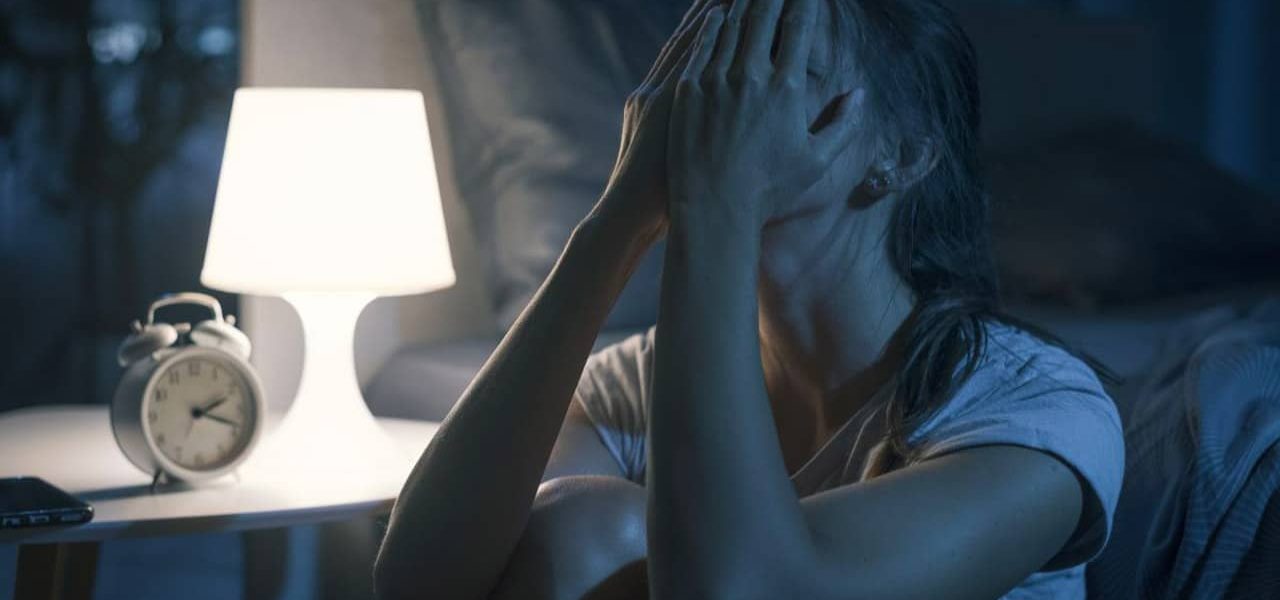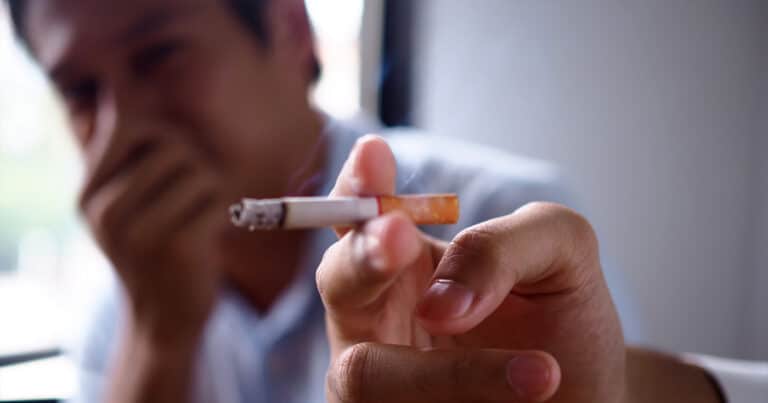How Long Does the Symptom of Insomnia Last After Quitting Smoking?
It’s undeniable: quitting smoking is the best decision you can make for your health! However, quitting smoking can cause very unpleasant symptoms, such as insomnia. This difficulty in falling asleep is often hard to overcome for smokers who are trying to quit cigarettes. Rest assured: these disturbances are only temporary!
But how long do they last? What exactly causes them? And how can you overcome them? Reset Laser explains everything about insomnia after quitting smoking in this article!
Why Does Quitting Smoking Cause Insomnia?
A Symptom Related to Nicotine Withdrawal
Cigarettes contain nicotine, a particularly addictive substance. Its consumption provides relief, a sense of calm, but then the effect fades. To feel this pleasant sensation again, the smoker wants to smoke another cigarette. This vicious cycle leads to addiction and is accompanied by all the health problems we know.
Far from calming our brain, nicotine is actually a stimulant that drives us to consume more. When a smoker decides to quit smoking, they experience a significant nicotine withdrawal that causes physical symptoms of nicotine withdrawal. Without this stimulant, the ex-smoker feels fatigue and has difficulty sleeping properly.
Sleep Disorders: A Sign of Body Detoxification
These insomnias are thus a sign of physical nicotine withdrawal, but also of the body’s return to normal after months or even years of smoking. Indeed, your body is detoxifying and your brain must suddenly adapt to this new nicotine-free functioning.
This withdrawal process is accompanied by difficulty falling asleep, nightmares and dreams, frequent awakenings during the night, numerous intrusive thoughts, night sweats, and even insomnia. In short, the quality of your sleep takes a hit, but this symptom is completely normal.

How Long Does Insomnia Last After Quitting Smoking?
Certainly, the lack of sleep is particularly bothersome and hard to overcome. However, know that this symptom is temporary and that your sleep will even be of better quality after your withdrawal.
The duration of sleep disturbances is variable depending on the individual. On average, a few weeks are enough to regain restorative sleep. However, some people may take several months to sleep peacefully again, but the intensity of sleep disturbances decreases gradually. In any case, remember that these insomnias will eventually disappear one day or another, so it is important to continue your withdrawal despite the fatigue!
Our Tips for Combating Insomnia
Everyone reacts differently to nicotine withdrawal. If you have trouble falling asleep and sleeping well, there are tips you can implement daily. These tips will help you more easily overcome quitting smoking.
Maintain a Good Sleep Routine
Good sleep inevitably involves a sleep routine. Set a sleep schedule and stick to it to avoid disrupting your cycle. Go to bed and wake up at the same time every day. This rhythm will help synchronize your biological clock and facilitate falling asleep. Our advice? Go to sleep as soon as you feel tired!
During the first few weeks of quitting, avoid situations that might prevent you from following this routine: evening outings, parties, etc.
Avoid Stimulating Activities on Screens
Screen activities, such as watching TV, using a computer, browsing social media on your phone, or playing video games, disrupt your sleep. Even if these activities are tempting, they are far too stimulating. Moreover, the blue light from screens disrupts our biological clock. As a result, our brain is not at rest, even in bed!
To signal to your body that it’s time to sleep, turn off all screens at least 1 hour before bed. If you want to keep busy, choose calm and relaxing activities, like reading.
Stop Consuming Caffeine, Theine, and Alcohol
Even outside of withdrawal, coffee, tea, and alcohol disrupt sleep. Caffeine and theine are stimulants that remain in your body for a long time. Alcohol, on the other hand, can disrupt your sleep cycle. To avoid worsening your sleep disturbances, avoid these drinks.
Moreover, they also have a negative impact on other withdrawal symptoms. They can, for example, increase stress and anxiety. These substances are therefore simply to be avoided during this period!
Fall Asleep in a Sleep-Conducive Environment
There’s nothing worse than trying to fall asleep in an uncomfortable or noisy place. Your sleep environment indeed has an impact on the quality of your sleep! Make sure to lie down in your bed, in silence, in the dark, and in coolness (around 18°C maximum).
Exercise
Regular exercise improves the quality of your sleep. However, avoid intense exercises just before bed, at the risk of making this effort counterproductive! Preferably, do your physical activity 3 hours before going to sleep.
No need for intense workout sessions to see the benefits! A few dozen minutes of walking already have positive effects on your body.
Adopt a Balanced Diet
Eat light and balanced meals in the evening to prevent digestive disorders that can disrupt your sleep. Avoid foods that are too fatty, too sugary, and heavy that weigh on the stomach. Instead, choose a meal that will be easier to digest.
Relax
Need a little help falling asleep? Try relaxation techniques! Meditation, sophrology, yoga, a nice hot bath, or even a massage can help you relax, reduce the stress you accumulate during this tobacco-free period, and gently prepare your body for a good night’s sleep.
Seek Professional Help
Is your insomnia persisting? Despite your efforts, are you having trouble overcoming your sleep disturbances? In this case, we advise you to consult a healthcare professional. Depending on your situation, they can provide you with additional support to effectively manage this withdrawal symptom.

Quit Smoking Without Insomnia with Reset Laser
Do you want to live a smoke-free life without suffering the withdrawal side effects such as insomnia? With Reset Laser, it’s possible! This effective method of laser auriculotherapy stimulates specific points on the ear to eliminate your cigarette addiction.
In just one session, you no longer feel the physical need to smoke, nor the physical symptoms of quitting smoking. Thus, your nicotine withdrawal is done gently! Interested? Make an appointment at one of our anti-smoking centers worldwide!
Make an appointment to stop smoking
Quitting smoking is a challenge, but with the right methods and support, it is possible to succeed. The risks of smoking to the lungs are serious, but the benefits of quitting are significant and begin to show quickly.
The Reset Laser method offers a promising alternative, free from nicotine and harmful chemicals, enabling smokers to regain better lung health safely and effectively. If you’re looking to give up smoking, book an appointment at a Reset Laser centre for a successful and lasting stop.
Why Choose RESET Laser Institute
The best method to quit smoking
Specialist
Our therapists are all addiction experts and specialists in laser auriculotherapy cessation.
Effectiveness
Our success rate after one session is over 86%.
Painless
Non-invasive and painless, our therapy is accessible to everyone.

No Stress
You free yourself from addictions and quit smoking without weight gain, stress, or compensation.
Personalized Support
Since each patient is different, we offer personalized support after the session.
1-Year Guarantee
We guarantee our therapy for 1 year in case of relapse.






